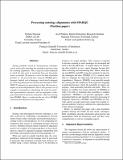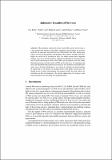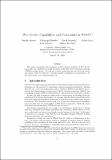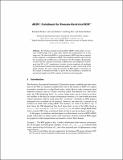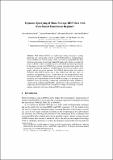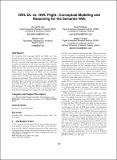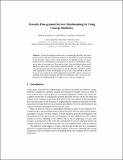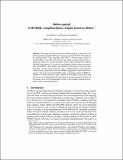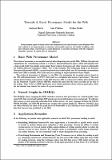Search
Now showing items 1-10 of 32
Processing ontology alignments with SPARQL
(IEEE, 2008)
Solving problems raised by heterogeneous ontologies can be achieved by matching the ontologies and processing the resulting alignments. This is typical of data mediation in which the data must be translated from one ...
Automatic Location of Services
(2005)
The automatic location of services that fulfill a given need is seen as a key step towards dynamic and scalable integration. In this paper we present a model for the automatic location of services that considers the static ...
Web Service Capabilities and Constraints in WSMO
(2004)
This paper summarizes the necessities on the semantic modeling of Web Service constraints and capabilities from the viewpoint of the Web Service Modeling Ontology(WSMO) working group. We will give a short motivating use ...
Entailment for Domain-restricted RDF
(Springer, 2008)
We introduce domain-restricted RDF (dRDF) which allows to associate an RDF graph with a fixed, finite domain that interpretations for it may range over. We show that dRDF is a real extension of RDF and discuss impacts on ...
Dynamic Querying of Mass-Storage RDF Data with Rule-Based Entailment Regimes
(Springer, 2009)
RDF Schema (RDFS) as a lightweight ontology language is gaining popularity and, consequently, tools for scalable RDFS inference and querying are needed. SPARQL has become recently aW3C standard for querying RDF data, ...
A Logical Framework for Web Service Discovery
(IEEE, 2004)
Current technologies for Web Services are based on syntactical descriptions and, therefore, lend themselves to only limited amount of automation. Research efforts in Semantic Web Services, such as WSMO, try to overcome ...
OWL DL vs. OWL Flight: Conceptual Modeling and Reasoning for the Semantic Web
(2005)
The Semantic Web languages RDFS and OWL have been around for some time now. However, the presence of these languages has not brought the breakthrough of the Semantic Web the creators of the languages had hoped for. OWL has ...
Towards Fine-grained Service Matchmaking by Using Concept Similarity
(2007)
Several description frameworks to semantically describe and match services on the one hand and service requests on the other have been presented in the literature. Many of the current proposals for defining notions of ...
dlvhex-sparql: A SPARQL-compliant query engine based on dlvhex
(CEUR, 2007)
This paper describes the dlvhex SPARQL plugin, a query processor for the upcoming Semantic Web query language standard by W3C. We report on the implementation of this languages using dlvhex, a flexible plugin system ...
Towards a social provenance model for the Web
(2007)
In this position paper we firstly present the established notion of provenance on the Semantic Web (also referred to as named graphs or contexts), and secondly argue for the benefit of adding to the pure technical notion ...

